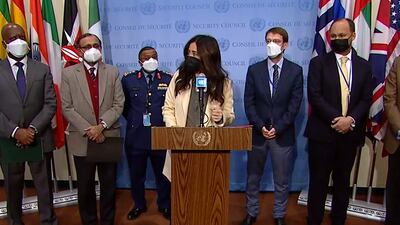To speak with one voice is the gravest challenge to the international community, especially at the apex of the system – the UN Security Council (UNSC).
The institution must be seized by a common concern in doing so, and on Friday the UNSC issued its unanimous support for a statement that called for the Houthi perpetrators of the terror attack on sites in the UAE to be held to account.
The statement was backed by all 15 members of the UNSC. The ambassadors stood shoulder to shoulder with UAE ambassador to the UN Lana Nusseibeh as she spoke on the unanimous agreement after the meeting.
Also present at the meeting were permanent council members Russia and China.
An analysis of the two countries prepared for the European Parliament has noted how Chinese and Russian officials seek to use their positions at the UN.
Both states attach fundamental importance to the principle of the UN as the core of global government in matters to do with security. It noted that however different the perspectives of Beijing and Moscow, their officials have a shared underlying concern of avoiding doing anything that in their eyes is likely to undermine the prestige and effectiveness of the UNSC.
“In fact, they want to see a stronger UN,” the brief said. “Diplomacy needs to recognise the importance that both states attach to their status as [permanent members of the UNSC]."
It went on to say that Russia and China attach great weight to the impartiality of UN sources and that when trying to influence the two countries' positions, it was best to “refer as much as possible to UN sources and data".
While Russia has a track record of working closely with Iran, it also has worked to build ties across the region. And China has promoted its five-point initiative for Mena security in recent years as part of a growing geopolitical shift.
In an analysis for think tank Responsible Statecraft, China specialist Jonathan Fulton wrote this week that Beijing had a variety of strategic reasons for deeper involvement and engagement with the Gulf states.
“China has become an important political actor in the Middle East,” he wrote.
“It has been articulating an increasingly ambitious regional presence and Mena leaders are receptive.
“The past year has demonstrated the increasingly multifaceted nature of China's presence in the region, including a nascent but growing role in security affairs.”

The consensus shown on Friday did not come out of the blue. The attack on the UAE, a country that is home to almost 200 nationalities and is a pillar of growing regional prosperity, was something antithetical to the region's partners.
“The members of the Security Council condemned in the strongest terms the heinous terrorist attacks in Abu Dhabi, United Arab Emirates, on Monday, 17 January, as well as in other sites in Saudi Arabia,” the UNSC statement said.
“The members of the Security Council underlined the need to hold perpetrators, organisers, financiers and sponsors of these reprehensible acts of terrorism accountable and bring them to justice.”
That there is axiomatic support from all five permanent members of the Security Council stands out at a time when there are plenty of divisions in the body's top tier. Afghanistan, Syria and Libya, for example, are areas where there has been little co-operation for the best part of a decade.
But in other areas, divisions are increasingly being put aside.
As recently as last week, the members of the Security Council condemned the Houthi seizure and detention of the UAE-flagged vessel, RWABEE, off the coast of Yemen.
“They demanded the immediate release of the vessel and its crew and underscored the necessity of ensuring the crew’s safety and well-being until their release,” the statement said.
“They called on all sides to resolve the issue quickly and underlined the importance of freedom of navigation in the Gulf of Aden and Red Sea, in accordance with international law.
“The members of the Security Council recalled their condemnation of the increasing number of incidents off the coast of Yemen, including attacks on civilian and commercial ships, which pose a significant risk to the maritime security of vessels in the Gulf of Aden and Red Sea.
“The members of the Security Council urged all parties to de-escalate the situation in Yemen and to engage constructively with the United Nations Special Envoy in order to return to inclusive political talks.”


